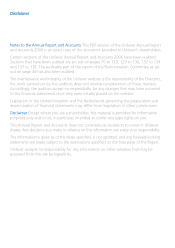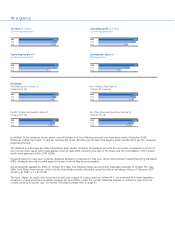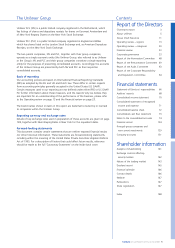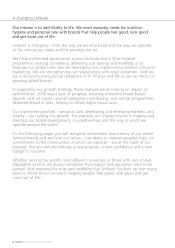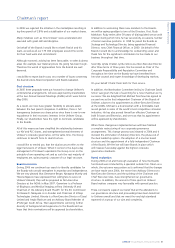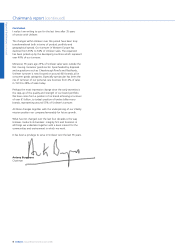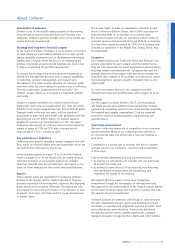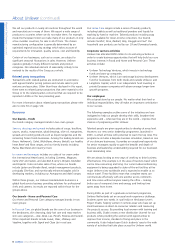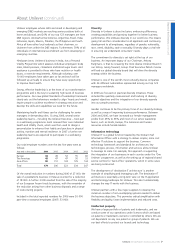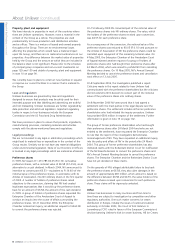Unilever 2006 Annual Report Download - page 6
Download and view the complete annual report
Please find page 6 of the 2006 Unilever annual report below. You can navigate through the pages in the report by either clicking on the pages listed below, or by using the keyword search tool below to find specific information within the annual report.
Chairman’s report
In 2006 we regained the initiative in the marketplace resulting in
top line growth of 3.8% and a stabilisation of our market shares.
Many initiatives such as ‘One Unilever’ were accelerated and
executed with great skill and discipline.
On behalf of the Boards I would like to thank Patrick and his
team, as well as all our 179 000 employees around the world,
for their hard work and commitment.
Although economic activity has been favourable, in other business
areas (for example raw material prices) the going has been tough.
Therefore the words of appreciation from the Boards are well
deserved.
Iwould like to report back to you on a number of issues concerning
the dual structure, Board composition and Board evaluation.
Dual structure
In 2005 three proposals were put forward to change Unilever’s
constitutional arrangements. All were approved by shareholders
at the two Annual General Meetings (AGMs) which were held in
May 2006.
As a result, we now have greater flexibility to allocate assets
between the two parent companies. In addition, there is full
transparency between our share prices since there is one-to-one
equivalence in their economic interests in the Unilever Group.
Finally, our shareholders have the right to nominate candidates
to the Boards.
All of this means we have simplified the relationship between
our NV and PLC shares, and strengthened several elements of
Unilever’scorporate governance. At the same time, the Group
continues to benefitfrom its dual structure.
Iwould like to remind you that the dual structure refers to the
legal framework of Unilever. When it comes to the day-to-day
management of Unilever’soperations the Group is run on the
principle of one operating unit and as such the vast majority of
employees are, quite properly, unaware of our legal structure.
Board succession
During 2006 we continued our search to identify candidates for
the Boards who would strengthen its expertise and independence.
We are very pleased that Genevieve Berger, Narayana Murthy and
Hixonia Nyasulu have expressed their willingness to serve on
Unilever’sBoards; they will be proposed as Non-Executive
Directors at the AGMs in May 2007. Genevieve is a Professor
of Biophysics and Medical Imaging at Paris University VI and
Chairman of the Advisory Board ‘Health’ for the EU Commission
for Research. Narayana is co-founder and Chairman of Infosys
Technologies Limited. Hixonia is a Non-Executive Director of Sasol
Limited and Anglo Platinum and an Advisory BoardMember of
JP Morgan South Africa. Their appointments will bring further
diversity of background and experience to the Boards and we
hope that their nominations will be approved by shareholders.
In addition to welcoming these new members to the Boards,
we will be saying goodbye to two of the Directors. First, Rudy
Markham. Rudy retires after 39 years of distinguished service with
Unilever during which time he has successfully occupied a number
of senior executive positions. In 1998 he joined the Boards as
Strategy and Technology Director, being appointed Financial
Director, now Chief Financial Officer, in 2000. On behalf of the
Boards I would like to acknowledge his outstanding career and
thank him for the significant contribution he has made to our
business throughout that time.
Secondly, Lynda Chalker. Lynda retires as a Non-Executive Director
after three terms of three years. She has served as Chair of the
Corporate Responsibility and Reputation Committee and
throughout her time on the Boards we have benefited from
her wise counsel and expert knowledge of developing markets.
On your behalf I thank them both for their service.
In addition, the Nomination Committee led by its Chairman David
Simon was given the task of searching for a new Chairman as my
successor. We are delighted that Michael Treschow has agreed to
succeed me as the first independent Chairman of the Boards of
Unilever, subject to his appointment as a Non-Executive Director
at the AGMs. Michael is a businessman with a formidable track
record gained in some of the world’s most competitive consumer
industries. He has also proved himself an effective Chairman at
both Ericsson and Electrolux, and we trust that his appointment
will be approved by shareholders.
When these changes areimplemented we will have finalised
acomplete restructuring of our corporate governance
arrangements. This change process was initiated in 2004 and it
involved the elimination of Advisory Directors, the phase-out of
the dual leadership system, the adoption of a one-tier board
structure and the appointment of a fully independent Chairman
of the Boards. We feel we will have Boards in place which
will measure favourably against the highest corporate
governance standards.
Board evaluation
During 2006 a full and thorough evaluation of how the Boards
functioned was conducted by a specialist outside firm. Taken as a
whole, the outcome was positive as it confirmed that the changes
we have made since 2004, the move from Advisory Directors to
Non-Executive Directors and the splitting of the Chairman and
Chief Executive roles, have strengthened our governance
structure. In addition, the amount of time spent on Unilever
Board matters compares very favourably with general practice.
These conclusions support our belief that all the alterations to
our governance structure and proceedings have been beneficial
to Unilever overall and that we meet the very high standards
expected of a group of our size and complexity.
Unilever Annual Report and Accounts 2006 3
Report of the Directors

